Fr. Roberto P. Reyes
October 2, 2007
Lost of face, shame, embarrassment brought about by a variety of causes drive many Asians, including Filipinos to acts ranging from dramatic to tragic. Failure, rejection, being caught red handed, conviction in court, etc. have led to the tragic and drastic end of lives. This is easy enough to understand when it affects us, our persons, our self-worth, reputation and well being. We have heard of and read about how extremes of shame and embarrassment have killed the human will to live. In Japan, suicide is even more honorable than living with the shame or dishonor of one’s misdeeds. One either commits “hara-kiri” which literally means slitting one’s stomach or “suppuku” which entails having oneself beheaded by one’s closest friend.
But what if it is not about us? What if the shame is upon others whose actions are blatantly shameless because of the depths of depravity and inhumanity their actions have sunk into? However, the other’s shame seems beyond our control. What if the other or others have lost all sense of shame and honor? Do we have any responsibility for the shameful acts of others? What if they have become callous, hardened and viciously shameless to their very core? Is it enough just to condemn and denounce their shameful acts and their shamelessness to boot?
Something most depraved and shameful is happening in Burma. From now on I choose to call this beautiful and noble country Burma in recognition of the historical dignity of a people before the present Military Junta stole their right to self-determination, symbolized by the very name the Army Generals have chosen, “Myanmar.” Last week, monks walked the streets of Burma creating a saffron sea of peaceful defiance of evil. Since 1962, the year the military under General Ne Win overthrew democracy and established what they called the “Burmese Way to Socialism,” the Burmese people have suffered untold oppression and the constant trampling of their fundamental rights as persons. The only force that quietly stood up to the cold, chilling power of steel and gun powder was the gentle and hidden power of the Dhamma in the hearts and shaven heads of Buddhist monks and laity who comprise the majority of the people. In 1990, a lay Buddhist in the person of a woman rose in prominence by winning Burma’s National Election. In spite of an overwhelming victory over the Burmese military regime, she was never allowed to take office and instead has been on and off put under house arrest. The world knows this woman well and draws inspiration from her courage and faith. Aung San Suu Kyi over the last seventeen years has given a face to the Burmese people’s struggle for freedom and democracy. Last week, a few monks who have been part of the peaceful walk for peace and freedom visited Suu Kyi. Many of these monks have been imprisoned. Many of them have already been murdered.
Today two faces speak to us of Burma, Aung San Suu Kyi and the Buddhist Monks. Two sad and suffering but courageous faces speak and beckon us to look their way, heed their cries muted and stifled by desperate, fearful, soulless military might. Aung San Suu Kyi even in house arrest speaks to us. Recently, the Buddhist monks have done even more. They walked and allowed their beaten, tortured, imprisoned and bleeding bodies to speak. Many of the monks are now in prison. Local and Foreign Media are suppressed. Telecommunication and internet connections have been cut. The Military Junta is slowly isolating Burma from the rest of the world. It is isolating the Burmese people from the rest of human kind.
This reminds us of Hitler’s holocaust, to silence a people not for now but forever. To silence by extermination! During those black and shameful years, many nations and institutions stood in silent horror at Germany’s inhumanity. Most churches were silent. The Catholic Church was silent. While systematic murder took place, the world was engulfed by a death-like, shameful and shameless silence. The world cannot be silent again. The world cannot be numbed into shameful and shameless surrender to evil. Certainly, the hungry, tortured and murdered in Burma are letting out shouts, screams, shrieks too horrible even to imagine. We cannot hear them as they have been locked up and away in prisons and detention centers. Burma has become a contemporary “konsentration lager” eerily reminiscent of Hitler’s Germany. The only salvation of those within the death camps is for those who are outside to speak out and against this hideous monstrosity.
We can begin by expressing not only disdain but collective shame for we are part of the same humanity that imprisons and kills not only freedom and democracy but the very people who hunger for these.
I am a Filipino Catholic priest, although neither Burmese not Buddhist, a human person all the same. I shout with all my might to the highest heavens in shame and indignation against the inhumanity of the Burmese Army to the Burmese people. We are tempted and rightfully so to declare that the Burmese Military Junta should be ashamed of themselves. Thereby, we blame them, then keep quiet and walk away righteously content that we have done enough. No we share the shame and allow it to move us to save innocent and holy lives. I am ashamed and ask the rest of the world to bow low to kiss the mud of our collective shame with lips that will not be sealed.
I end with a chilling reminder from the German philosopher and political activist Hannah Arendt:
“For many years now we have met Germans who declare that they are ashamed of being Germans. I have often felt tempted to answer that I am ashamed of being human. This elemental shame, which many people of the most various nationalities share with one another today, is what is finally left of our international solidarity; and it has not yet found an adequate political expression. Our father’s enchantment with humanity was of a sort which not only light-mindedly ignored the national question: what is far worse, it did not even conceive of the terror of the idea of humanity and of the Judeo-Christian faith in the unitary origin of the human race…”
(Cf. Hannah Arendt, “Essays in Understanding, 1930-1954, Formation, Exile and Totalitarianism,” (New York: Schocken Books, 1994)
October 2, 2007
Lost of face, shame, embarrassment brought about by a variety of causes drive many Asians, including Filipinos to acts ranging from dramatic to tragic. Failure, rejection, being caught red handed, conviction in court, etc. have led to the tragic and drastic end of lives. This is easy enough to understand when it affects us, our persons, our self-worth, reputation and well being. We have heard of and read about how extremes of shame and embarrassment have killed the human will to live. In Japan, suicide is even more honorable than living with the shame or dishonor of one’s misdeeds. One either commits “hara-kiri” which literally means slitting one’s stomach or “suppuku” which entails having oneself beheaded by one’s closest friend.
But what if it is not about us? What if the shame is upon others whose actions are blatantly shameless because of the depths of depravity and inhumanity their actions have sunk into? However, the other’s shame seems beyond our control. What if the other or others have lost all sense of shame and honor? Do we have any responsibility for the shameful acts of others? What if they have become callous, hardened and viciously shameless to their very core? Is it enough just to condemn and denounce their shameful acts and their shamelessness to boot?
Something most depraved and shameful is happening in Burma. From now on I choose to call this beautiful and noble country Burma in recognition of the historical dignity of a people before the present Military Junta stole their right to self-determination, symbolized by the very name the Army Generals have chosen, “Myanmar.” Last week, monks walked the streets of Burma creating a saffron sea of peaceful defiance of evil. Since 1962, the year the military under General Ne Win overthrew democracy and established what they called the “Burmese Way to Socialism,” the Burmese people have suffered untold oppression and the constant trampling of their fundamental rights as persons. The only force that quietly stood up to the cold, chilling power of steel and gun powder was the gentle and hidden power of the Dhamma in the hearts and shaven heads of Buddhist monks and laity who comprise the majority of the people. In 1990, a lay Buddhist in the person of a woman rose in prominence by winning Burma’s National Election. In spite of an overwhelming victory over the Burmese military regime, she was never allowed to take office and instead has been on and off put under house arrest. The world knows this woman well and draws inspiration from her courage and faith. Aung San Suu Kyi over the last seventeen years has given a face to the Burmese people’s struggle for freedom and democracy. Last week, a few monks who have been part of the peaceful walk for peace and freedom visited Suu Kyi. Many of these monks have been imprisoned. Many of them have already been murdered.
Today two faces speak to us of Burma, Aung San Suu Kyi and the Buddhist Monks. Two sad and suffering but courageous faces speak and beckon us to look their way, heed their cries muted and stifled by desperate, fearful, soulless military might. Aung San Suu Kyi even in house arrest speaks to us. Recently, the Buddhist monks have done even more. They walked and allowed their beaten, tortured, imprisoned and bleeding bodies to speak. Many of the monks are now in prison. Local and Foreign Media are suppressed. Telecommunication and internet connections have been cut. The Military Junta is slowly isolating Burma from the rest of the world. It is isolating the Burmese people from the rest of human kind.
This reminds us of Hitler’s holocaust, to silence a people not for now but forever. To silence by extermination! During those black and shameful years, many nations and institutions stood in silent horror at Germany’s inhumanity. Most churches were silent. The Catholic Church was silent. While systematic murder took place, the world was engulfed by a death-like, shameful and shameless silence. The world cannot be silent again. The world cannot be numbed into shameful and shameless surrender to evil. Certainly, the hungry, tortured and murdered in Burma are letting out shouts, screams, shrieks too horrible even to imagine. We cannot hear them as they have been locked up and away in prisons and detention centers. Burma has become a contemporary “konsentration lager” eerily reminiscent of Hitler’s Germany. The only salvation of those within the death camps is for those who are outside to speak out and against this hideous monstrosity.
We can begin by expressing not only disdain but collective shame for we are part of the same humanity that imprisons and kills not only freedom and democracy but the very people who hunger for these.
I am a Filipino Catholic priest, although neither Burmese not Buddhist, a human person all the same. I shout with all my might to the highest heavens in shame and indignation against the inhumanity of the Burmese Army to the Burmese people. We are tempted and rightfully so to declare that the Burmese Military Junta should be ashamed of themselves. Thereby, we blame them, then keep quiet and walk away righteously content that we have done enough. No we share the shame and allow it to move us to save innocent and holy lives. I am ashamed and ask the rest of the world to bow low to kiss the mud of our collective shame with lips that will not be sealed.
I end with a chilling reminder from the German philosopher and political activist Hannah Arendt:
“For many years now we have met Germans who declare that they are ashamed of being Germans. I have often felt tempted to answer that I am ashamed of being human. This elemental shame, which many people of the most various nationalities share with one another today, is what is finally left of our international solidarity; and it has not yet found an adequate political expression. Our father’s enchantment with humanity was of a sort which not only light-mindedly ignored the national question: what is far worse, it did not even conceive of the terror of the idea of humanity and of the Judeo-Christian faith in the unitary origin of the human race…”
(Cf. Hannah Arendt, “Essays in Understanding, 1930-1954, Formation, Exile and Totalitarianism,” (New York: Schocken Books, 1994)
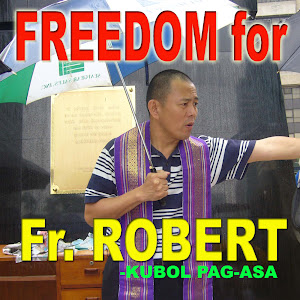+tarp+Fr.+Robert+3++copy.jpg)
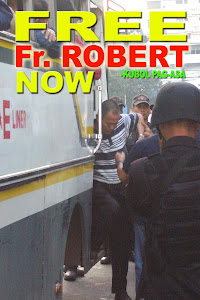+tarp+Fr.+Robert+2+copy.jpg)























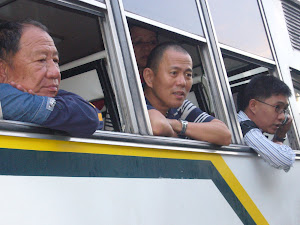








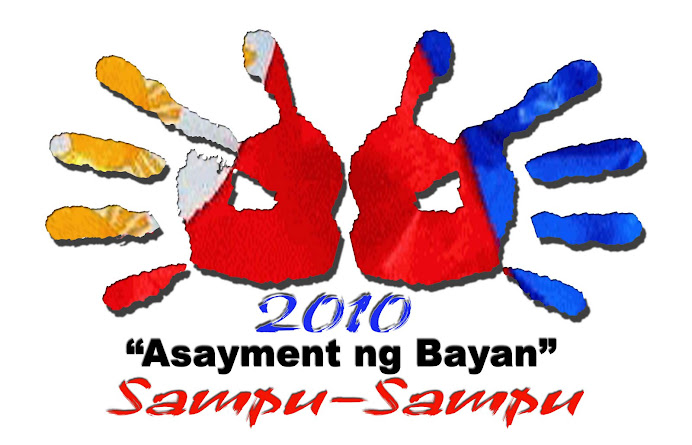

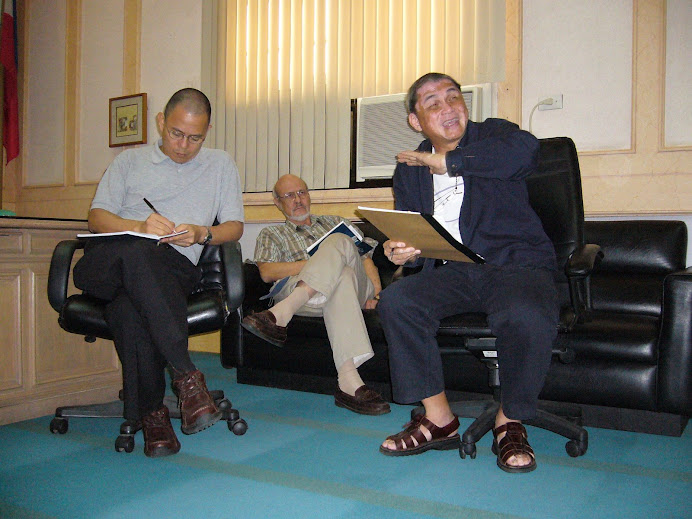
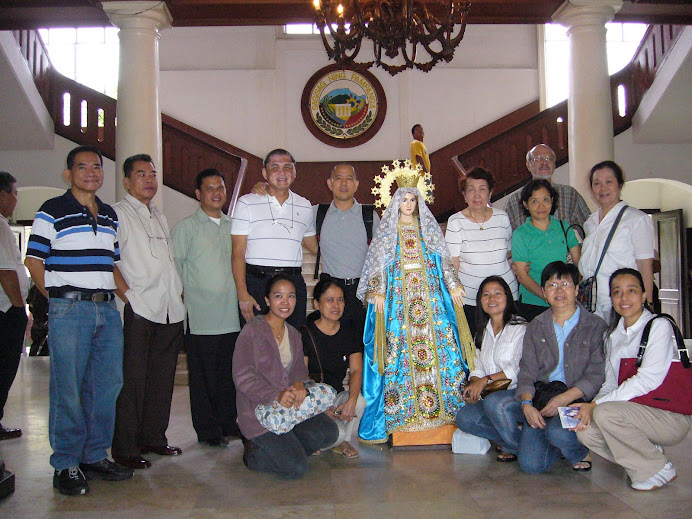
No comments:
Post a Comment